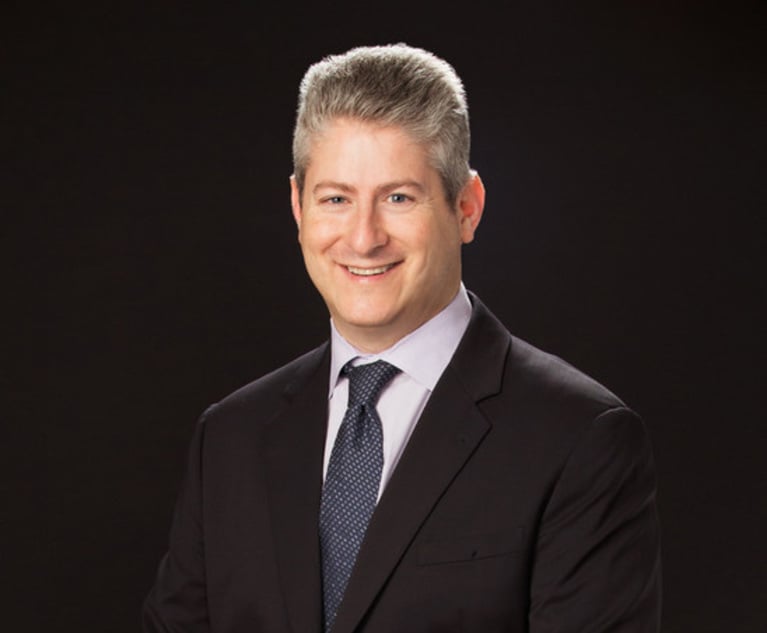Dismissal, Sanctions Upheld in Ex-Allen & Overy Lawyer's Sexual Harassment Suit Against Firm
The lawsuit brought by Deidre Holmes Clark, once a senior attorney at the firm's Moscow office, was thrown out after she repeatedly refused to submit to a court-ordered psychological exam.
March 09, 2018 at 11:29 AM
4 minute read
 Allen & Overy's Washington, D.C., offices/photo courtesy of Diego M. Radzinschi/ALM
Allen & Overy's Washington, D.C., offices/photo courtesy of Diego M. Radzinschi/ALM
A state appeals court ruled Thursday that a former Allen & Overy lawyer who leveled a $35 million lawsuit at the firm for sexual harassment, retaliatory discharge and emotional distress properly had her suit dismissed after she refused to submit to a court-ordered psychological exam.
In addition, Deidre Holmes Clark, once a senior attorney at the international firm, was rightfully sanctioned by the trial court for violating its sealing orders when she maliciously posted about the case on social media in an attempt to harass or injure Allen & Overy, a unanimous Appellate Division, First Department, panel decided.
The ruling was the latest chapter in a legal battle between Clark and her former firm that has spanned two continents and nine years. It began in 2009 when Clark, who'd been working in Allen & Overy's Moscow office, sued the Magic Circle law firm in London, alleging that she'd been fired improperly. That suit was thrown out on jurisdictional grounds, but Clark, a Columbia Law School graduate and member of the New York bar, brought a new lawsuit in 2011 in Manhattan Supreme Court.
The thrust of that nine-count suit, in which she represented herself, was that she was harassed and ultimately fired after a drunken sexual encounter with Tony Humphrey, a former Moscow partner at Allen & Overy. Moreover, she claimed that Allen & Overy had created a pretext for her firing, pointing to her publishing of a serialized, steamy e-novel in Moscow under her law practice name.
The novel, according to news reports, was titled “Expat” and included tales of drug taking, binge drinking and sex shows.
Some counts of the lawsuit were thrown out, but it continued for years, and Clark demanded $15 million alone for intentional infliction of emotional distress. She said her distress had manifested itself through “extreme mental and physical anguish,” according to court documents. And in deposition testimony, she testified that she suffered from eczema, hair pulling, anxiety, depression and suicidal thoughts.
Manhattan Supreme Court Justice Louis York determined in 2014 that Clark had made her mental state a matter of controversy and granted Allen & Overy's request that Clark be examined by a psychiatrist.
In August 2016, Manhattan Supreme Court Justice Kathryn Freed ruled on various motions, including granting Allen & Overy's motions to dismiss Clark's complaint pursuant to CPLR 3126 and for sanctions. Freed also, according to the panel, ordered Clark to pay $5,000 to the Lawyers' Fund for Client Protection under 22 NYCRR 130-1.1(a) and to pay Allen & Overy its costs and attorney fees incurred in bringing the sanctions motion.
On Thursday, the panel, comprised of Justices John Sweeny, Sallie Manzanet-Daniels, Angela Mazzarelli, Jeffrey Oing and Peter Moulton, affirmed Freed's rulings. The justices pointed to Clark's actions in repeatedly refusing to comply with a court order to undergo the psychiatric examination ordered in 2014.
Clark has “continued to refuse to schedule or sit for the IME [independent medical examination],” the panel wrote. The justices added that “on November 11, 2015, plaintiff appeared at the examiner's office. However, she refused to take the microphone to be audiotaped, and she informed the examiner that she would go to the police and charge him with false imprisonment and assault if he proceeded with the examination without her consent.”
“Under the circumstances,” wrote the panel, “the [trial] court properly dismissed the complaint for noncompliance pursuant to CPLR 3126.”
The panel added that the financial sanctions imposed on Clark were proper because she “violated the court's sealing orders by posting about the case to her social media networks” and “falsely represented that she had not refused to sit for the IME and that discovery had been waived.”
Clark could not be reached for comment. Nor could Rachel Fischer, a Proskauer Rose associate in New York who represented Allen & Overy.
This content has been archived. It is available through our partners, LexisNexis® and Bloomberg Law.
To view this content, please continue to their sites.
Not a Lexis Subscriber?
Subscribe Now
Not a Bloomberg Law Subscriber?
Subscribe Now
NOT FOR REPRINT
© 2025 ALM Global, LLC, All Rights Reserved. Request academic re-use from www.copyright.com. All other uses, submit a request to [email protected]. For more information visit Asset & Logo Licensing.
You Might Like
View All

Cooley Promotes NY Office Leader to Global Litigation Department Chair

NY Judge Resigns After Avoiding Jury Duty by Telling Court He Couldn't Be Impartial

Charlie Javice Jury Will Not See Her Texts About Elizabeth Holmes
Trending Stories
Who Got The Work
J. Brugh Lower of Gibbons has entered an appearance for industrial equipment supplier Devco Corporation in a pending trademark infringement lawsuit. The suit, accusing the defendant of selling knock-off Graco products, was filed Dec. 18 in New Jersey District Court by Rivkin Radler on behalf of Graco Inc. and Graco Minnesota. The case, assigned to U.S. District Judge Zahid N. Quraishi, is 3:24-cv-11294, Graco Inc. et al v. Devco Corporation.
Who Got The Work
Rebecca Maller-Stein and Kent A. Yalowitz of Arnold & Porter Kaye Scholer have entered their appearances for Hanaco Venture Capital and its executives, Lior Prosor and David Frankel, in a pending securities lawsuit. The action, filed on Dec. 24 in New York Southern District Court by Zell, Aron & Co. on behalf of Goldeneye Advisors, accuses the defendants of negligently and fraudulently managing the plaintiff's $1 million investment. The case, assigned to U.S. District Judge Vernon S. Broderick, is 1:24-cv-09918, Goldeneye Advisors, LLC v. Hanaco Venture Capital, Ltd. et al.
Who Got The Work
Attorneys from A&O Shearman has stepped in as defense counsel for Toronto-Dominion Bank and other defendants in a pending securities class action. The suit, filed Dec. 11 in New York Southern District Court by Bleichmar Fonti & Auld, accuses the defendants of concealing the bank's 'pervasive' deficiencies in regards to its compliance with the Bank Secrecy Act and the quality of its anti-money laundering controls. The case, assigned to U.S. District Judge Arun Subramanian, is 1:24-cv-09445, Gonzalez v. The Toronto-Dominion Bank et al.
Who Got The Work
Crown Castle International, a Pennsylvania company providing shared communications infrastructure, has turned to Luke D. Wolf of Gordon Rees Scully Mansukhani to fend off a pending breach-of-contract lawsuit. The court action, filed Nov. 25 in Michigan Eastern District Court by Hooper Hathaway PC on behalf of The Town Residences LLC, accuses Crown Castle of failing to transfer approximately $30,000 in utility payments from T-Mobile in breach of a roof-top lease and assignment agreement. The case, assigned to U.S. District Judge Susan K. Declercq, is 2:24-cv-13131, The Town Residences LLC v. T-Mobile US, Inc. et al.
Who Got The Work
Wilfred P. Coronato and Daniel M. Schwartz of McCarter & English have stepped in as defense counsel to Electrolux Home Products Inc. in a pending product liability lawsuit. The court action, filed Nov. 26 in New York Eastern District Court by Poulos Lopiccolo PC and Nagel Rice LLP on behalf of David Stern, alleges that the defendant's refrigerators’ drawers and shelving repeatedly break and fall apart within months after purchase. The case, assigned to U.S. District Judge Joan M. Azrack, is 2:24-cv-08204, Stern v. Electrolux Home Products, Inc.
Featured Firms
Law Offices of Gary Martin Hays & Associates, P.C.
(470) 294-1674
Law Offices of Mark E. Salomone
(857) 444-6468
Smith & Hassler
(713) 739-1250






